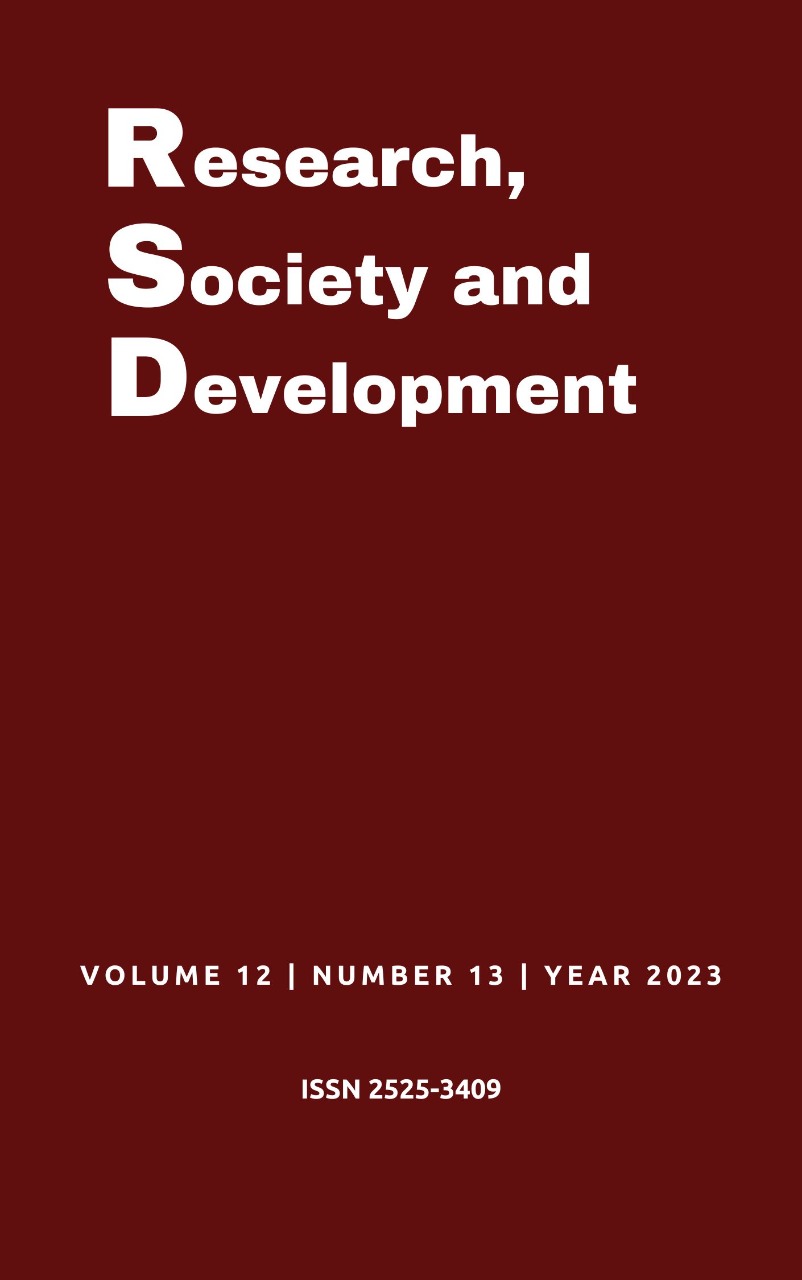Work-related quality of life of psychologists in the single welfare system in eleven municipalities of the Bolsão Region in the State of Mato Grosso do Sul
DOI:
https://doi.org/10.33448/rsd-v12i13.44111Keywords:
Quality of life, Work, Social welfare.Abstract
Goal: analyze the main Quality of Life aspects by relating work to the experiences of Psychology professionals acting in public policies of the Bolsão region in the State of Mato Grosso do Sul, Brazil. Methodology: this was an epidemiological, descriptive, and cross-sectional study involving 54 psychologists. The Work-Related Quality of Life Scale was used to determine the participants’ Quality of Life at Work scores. For this purpose, the Chi-square test and Fisher's exact test (where applicable) were applied, establishing proportional differences regarding the domain among the groups. Result: female predominance in the profession; use of alcohol; fatigue during the day; struggle to stay focused at work, and labor violence. The study reveals that psychologists face challenges that negatively affect their Work-Related Quality of Life, including work overload, lack of emotional support, and a hard time balancing personal and professional life. Final considerations: it is necessary to implement attention and caring strategies aimed at improving Work-Related Quality of Life, such as: reviewing work organization methods in the causes of dissatisfaction and mental illness; fostering a healthy and balanced work environment; developing emotional support and mental health care programs; offering training and refresher courses; encouraging self-care, and establishing a balance between personal and professional lives.
References
Bordalo, A. A. (2006). Estudo transversal e/ou longitudinal. Revista Paraense de Medicina, 20(4), 5.
Borges, L. O., & Argolo, J. C. T. (2002). Adaptação e validação de uma escala de bem-estar psicológico para uso em estudos ocupacionais. Avaliação Psicológica, 1(1), 17–27. http://scielo.iec.gov.br/pdf/rpm/v20n4/v20n4a01.pdf
Borsoi, I. C. F. (2007). Da relação entre trabalho e saúde à relação entre trabalho e saúde mental. Psicologia & Sociedade, 19, 103–111. https://www.scielo.br/j/psoc/a/ZK47NkYwTQv8w6cXcfVqP6S/?format=pdf&lang=pt
Campos, K. C. L., Duarte, C., Cezar, É. O., & Pereira, G. O. A. (2011). Psicologia organizacional e do trabalho – retrato da produção científica na última década. Psicologia: Ciência e Profissão, 31(4), 702–717. https://www.scielo.br/j/pcp/a/NKwfC9mJtLnYGZqc8wCF6mG/?format=pdf&lang=pt
Castro, A. E. F. D., & Yamamoto, O. H. (1998). A psicologia como profissão feminina: apontamentos para estudo. Estudos de Psicologia (Natal), 3(1), 147–158. https://www.scielo.br/j/epsic/a/8Hg6vvnhystWQ7cRqPWHdcF/?format=pdf&lang=pt
Fabri, N. V., Martins, J. T., Galdino, M. J. Q., Ribeiro, R. P., & Moreira, A. A. O. (2022). Violência laboral e qualidade de vida profissional entre enfermeiros da atenção primária. Acta Paulista de Enfermagem, 35, 1–8. https://www.scielo.br/j/ape/a/9yYM8LBX5Ys5DrZLrsMNVwD/?format=pdf&lang=pt
Felix, I. J. Jr., Schlindwein, V. L. D. C., & Calheiros, P. R. V. (2016). A relação entre o uso de drogas e o trabalho: uma revisão de literatura PSI. Estudos e Pesquisas em Psicologia, 16(1), 104–122. http://pepsic.bvsalud.org/pdf/epp/v16n1/v16n1a07.pdf
Luquini, I. M. A. M., Sartes, L. M. A., Ferreira, M. L., Cypriano, J. S. & Marco, A. A. (2018). Associação entre a satisfação no trabalho e uso de álcool: revisão sistemática. Psicologia: Teoria e Prática, 20(3), 240–261. http://pepsic.bvsalud.org/pdf/ptp/v20n3/pt_v20n3a11.pdf
Martinez, M. C., & Paraguay, A. I. B. B. (2003). Satisfação e saúde no trabalho: aspectos conceituais e metodológicos. Cadernos de Psicologia Social do Trabalho, 6, 59–78. https://www.revistas.usp.br/cpst/article/view/25851/27583
Menandro, P. R. M. (2010). Réplica 2 – mestrado profissional, você sabe com quem está falando? Revista de Administração Contemporânea, 14(2), 367–371. https://www.scielo.br/j/rac/a/zRLqQ68QkzvnZYWVQNf9kQr/?format=pdf&lang=pt
Mendonça, J. M. B., Siqueira, M. V. S., Santos, M. A. F., & Medeiros, C. R. O. (2018). Violências no ambiente de trabalho: ponderações teóricas. Psicologia & Sociedade, 30, 1–11. https://www.scielo.br/j/psoc/a/kNjFccMkmTzSqSFR88f4hBM/?format=pdf&lang=pt
Minayo, M. C. S., Hartz, Z. M. A., & Buss, P. M. (2000). Qualidade de vida e saúde: um debate necessário. Ciência & Saúde Coletiva, 5(1), 7–18. https://www.scielo.br/j/csc/a/MGNbP3WcnM3p8KKmLSZVddn/?format=pdf&lang=pt
Moreira, M. M. S. (2000). Trabalho, qualidade de vida e envelhecimento [Master's thesis, Escola Nacional de Saúde Pública, Fundação Oswaldo Cruz]. Respositório Intitucional da Fiocruz. https://www.arca.fiocruz.br/bitstream/handle/icict/4877/ve_Marilda_Maria_ENSP_2000?sequence=2&isAllowed=y
Organização Mundial da Saúde. (1946). Constituição da Organização Mundial da Saúde. OMS/WHO. https://edisciplinas.usp.br/pluginfile.php/5733496/mod_resource/content/0/Constitui%C3%A7%C3%A3o%20da%20Organiza%C3%A7%C3%A3o%20Mundial%20da%20Sa%C3%BAde%20%28WHO%29%20-%201946%20-%20OMS.pdf
Pedroso, B., Pilatti, L. A., Gutierrez, G. L., & Picinin, C. T. (2014). Construção e validação do TQWL-42: um instrumento de avaliação da qualidade de vida no trabalho. Revista de Salud Pública, 16(6), 885–896. https://www.scielosp.org/pdf/rsap/2014.v16n6/885-896/pt
Pie, A. C. S., Fernandes, R. C. P., Carvalho, F. M., & Porto, L. A. (2020). Fatores associados ao presenteísmo em trabalhadores da indústria. Revista Brasileira de Saúde Ocupacional, 45, 1–12. https://www.scielo.br/j/rbso/a/qrp3L67NtWyzqJQkKcqbBPn/?format=pdf&lang=pt
Rueda, F. J. M., Fernanda, O., Pinto, L. P., Lima, T. H., & Paula Bueno, J. M. (2013). Construção e validação de uma escala de avaliação da qualidade de vida no trabalho. Avaliação Psicológica, 12(1), 43–50. http://pepsic.bvsalud.org/pdf/avp/v12n1/v12n1a07.pdf
Tonetto, N., & Carlotto, M. S. (2021). Fatores de risco e proteção aos transtornos mentais comuns em estudantes adolescentes. Boletim – Academia Paulista de Psicologia, 41(101), 217–228. http://pepsic.bvsalud.org/pdf/bapp/v41n101/a08v41n101.pdf
World Health Organization Quality of Life Group. (1995). The World Health Organization Quality of Life Assessment (WHOQOL): Position paper from the World Health Organization. Social Science & Medicine, 41(10), 1.403–1.409. https://doi.org/10.1016/0277-9536(95)00112-K
Downloads
Published
Issue
Section
License
Copyright (c) 2023 Ivy Ivanira de Oliveira; Márcio Luís Costa; Jadson Justi

This work is licensed under a Creative Commons Attribution 4.0 International License.
Authors who publish with this journal agree to the following terms:
1) Authors retain copyright and grant the journal right of first publication with the work simultaneously licensed under a Creative Commons Attribution License that allows others to share the work with an acknowledgement of the work's authorship and initial publication in this journal.
2) Authors are able to enter into separate, additional contractual arrangements for the non-exclusive distribution of the journal's published version of the work (e.g., post it to an institutional repository or publish it in a book), with an acknowledgement of its initial publication in this journal.
3) Authors are permitted and encouraged to post their work online (e.g., in institutional repositories or on their website) prior to and during the submission process, as it can lead to productive exchanges, as well as earlier and greater citation of published work.


